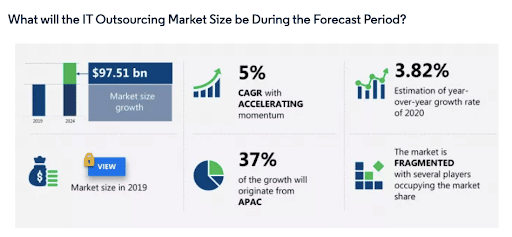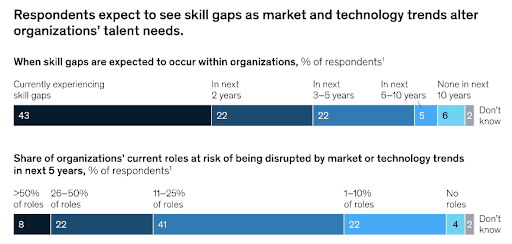It’s official: Extended development isn’t a fad, and dedicated software developers are here to stay.
The stats are unequivocal. Market research company Technavio expects the market share of the IT outsourcing industry to reach an impressive $97.51 billion by 2024, growing at a CAGR of 5%.

And no wonder. According to McKinsey, 87% of organizations face or expect to face tech skill gaps in the near future. With specialist expertise lacking in-house, more and more businesses are turning to external solutions.

This solves some issues but creates others. With dedicated software developers becoming the norm, the number of service providers globally has skyrocketed, and the outsourcing landscape has become harder to navigate.
In this oversaturated market, how can you tell if a potential candidate is right for the job? How do you know an outsourcing vendor is a good fit?
Here are some tell-tale signs to look for.
How to Hire Dedicated Software Developers
Hiring dedicated developers boils down to two critical issues: the characteristics of the developers themselves, on the one hand, and the workflows and software development practices they leverage, on the other.
The 5 Traits That Set the Best Dedicated Software Developers Apart
1. They Are Nice People
A common mistake when hiring dedicated software developers is to focus solely on professional background and technical expertise.
Don’t get us wrong: Hard skills, relevant experience, and familiarity with your tech stack are indeed critical. However, many people tick these boxes. You don’t have to take our word for it — a quick LinkedIn browsing session will suffice.
And if you’re working with an external vendor like Zartis who will build a developer team for you, you don’t even have to think about the technical fit. All you need to do is hand-pick your preferred candidates from a final shortlist and do final interviews for confirmation.
Instead of hyper-focusing on your dedicated developers’ tech expertise, consider their soft skills.
Good communication and interpersonal skills, proven ability to work in collaborative environments, and willingness to receive and implement constructive criticism are a must. You can’t build a robust software team culture if these core ingredients aren’t already there.
A helpful question to ask is, “Is this someone I’d want to work and hang out with?” If that’s a yes, they likely are a good cultural fit for your organization.
2. They Are Continuous Learners
Continuous learning isn’t a requirement for developers. It’s a necessity.
The software industry evolves constantly. To keep up, your dedicated developers should be able to adapt quickly to changing technologies. They must also be open to trying new methodologies and cooperation models.
A willingness to improve their soft skills, such as stress management, conflict resolution, or English skills if they aren’t native speakers, is likewise crucial.
That said, continuous learning is more than a personality trait of individual developers — it must also be deeply embedded in the outsourcing vendor’s company culture. To that end, ensure that your software development partner provides developers with ample and high-quality resources to enable constant learning and self-improvement.
At Zartis, for instance, engineers have access to best-in-class software developer training that includes:
- Self-directed study
- Peer-to-peer learning
- Individual feedback sessions
- Instructor-led training
- Digital resources such as online courses, platforms, and verified databanks
What’s more, we actively encourage and incentivize engineers to make time for learning and self-growth. This way, we can ensure that your dedicated software developers are always on top of their game and at the forefront of the technology curve.
3. They Are Innovative
Innovation isn’t just a buzzword used by marketing departments: It’s a key ingredient of successful software development.
Your dedicated developers should be able to come up with new creative solutions to problems, whether those are related to the product or its implementation. This includes identifying opportunities for improvement and suggesting ways to leverage them.
Working with innovation-minded partners becomes even more critical if you plan on contracting out not just individual product development but also product idea generation or strategic market research. This is known as innovation outsourcing, and the stakes are much higher compared to outsourcing short-term projects or peripheral activities.
So, you want to make sure that both your outsourcing vendor and the individual developers are keen to learn and grow (and take active steps in that direction), use new technologies, and are willing to explore solutions that challenge the norm.
4. They Aim High
Your ideal software development partner won’t suggest the easiest or quickest answers right off the bat. Instead, they will challenge themselves to deliver unique solutions, even if those are more complex and take longer to implement.
Note that this doesn’t mean always choosing complex solutions for complexity’s sake. Rather, it means exploring unconventional approaches when they offer a clear advantage over conventional ones. The goal is to build cost-effective, high-quality solutions that help you stand out from the crowd and further your business goals.
For example, consider a case where your dedicated software developers need to integrate two different systems into a single application. A traditional approach would involve creating an intermediary layer between the two. However, an innovative and arguably more effective solution would be to build a custom API allowing the systems to communicate directly.
5. They See Ahead
Your dedicated developers are not only there to meet your needs today but also to bring value in the long term. They should understand and share your product vision and proactively suggest ways to turn it into reality, such as proposing new features or improvements to the user experience.
Good software engineers also know that businesses need scalable solutions that can accommodate continuous change and growth. As we’ll see below, flexibility and agility are key here.
Best Practices for Hiring Dedicated Software Developers
Flexibility
Great software teams think on their feet. They are both able and willing to adjust plans and reallocate resources quickly in response to changing markets, customer requirements, or business demands. This includes:
- Finding solutions to emerging issues
- Switching tools and tech stacks as needed
- Adapting to changes in product specifications
- Tweaking internal processes, workflows, and schedules
Agility
“Agile” in this context refers to a specific software development approach.
Agile methodologies break up the development process into short cycles called sprints or iterations. Each sprint includes all or most phases of the software development life cycle and delivers a functional, albeit imperfect, application at the end. The developers then review the result, gather feedback, and develop requirements for the next sprint, which delivers an updated product.
This is different from traditional waterfall development, which is linear and completes the various phases of the development process — coding, testing, deployment, etc. — one at a time.
While both approaches have pros and cons, most teams today have an agile structure and use an agile software development methodology. It’s considerably more flexible than the waterfall model and doesn’t take as much development time to build a functional product.
Quality Assurance (QA)
An experienced tech partner never loses sight of product quality. Workflows must feature QA procedures as a matter of course and throughout the software development life cycle, not just at the end. This helps ensure that you end up with a high-quality product that meets all project specifications and your business requirements.
Automation
The best software developers don’t work hard. They work smart. One way to do this is by leveraging automation as much as possible to shorten development time, minimize the potential for human error, and reduce development costs.
The resulting budget gains are considerable. For instance, 24% of organizations that switch to automated QA testing report an immediate 24% increase in ROI. Another 24% see a ROI boost within the first six months, and 28% — within a year.
Regular Communication
Good communication between employees is critical for the success of any business. The software development industry is no different.
Your dedicated engineers should have frequent online and offline meetings (if possible), both with their immediate team members and your in-house staff. This ensures that everyone is on the same page regarding work and deliverables. It also helps achieve real integration and lays the foundation for successful cooperation between the internal and remote teams.
Reviews & Continuous Improvement
Lastly, good software engineering teams review and evaluate their work regularly. They collect, offer, and act on constructive feedback and constantly seek ways to improve the product, team cooperation, or the development process.
Hiring Dedicated Software Developers with Zartis
Need additional expertise for your software development project? We’ve got your back.
At Zartis, we specialize in building best-in-class teams of senior developers that function like seamless extensions to your in-house staff and drive business growth — only with none of the hassle and overhead of hiring full-time employees.
Find out how our dedicated software development teams can help you transform your business.


